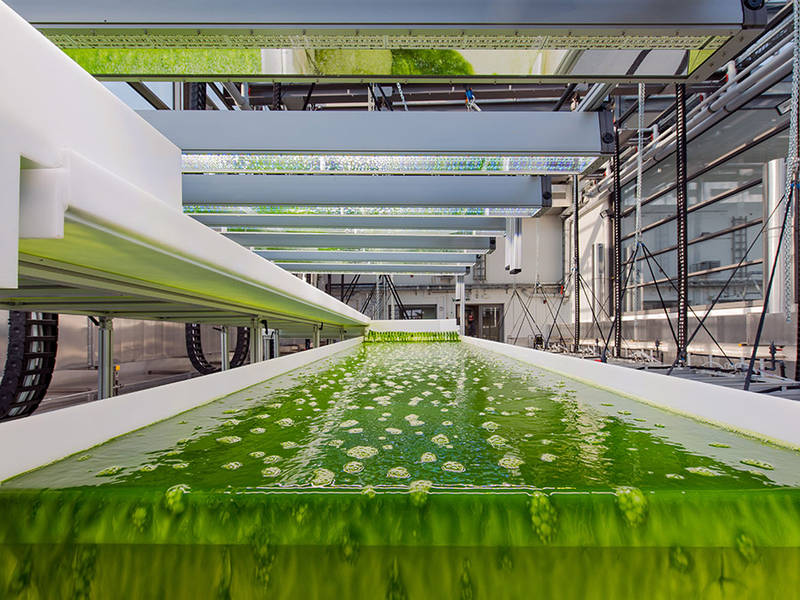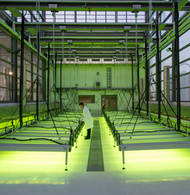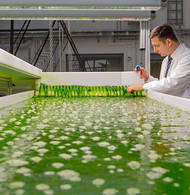
The Technical University of Munich (TUM) has built a worldwide one-of-a-kind technical facility for algae cultivation at the Ludwig Bölkow Campus in Ottobrunn to the south of Munich in cooperation with Airbus Group. Efficient processes for producing biokerosene and chemical products from algae will be developed there. The AlgaeTec facility was inaugurated today in the presence of the Bavarian Minister of Education, Cultural Affairs, Science and the Arts, Dr. Ludwig Spaenle, Airbus Group’s Chief Technical Officer, Dr. Jean Botti, and TUM president, Professor Wolfgang A. Herrmann.
Scientists estimate that there are some 150,000 different types of algae. Around 5,000 of them have been fundamentally characterized, yet only around ten species have been implemented for commercial exploitation. With their new algae facility, researchers aim to change this. They hope to develop efficient processes for the production of biokerosene and chemical products there.
The 1,500 square meter building houses three areas for algae cultivation, as well as laboratory and office space. What sets the Ottobrunn algae center apart is the fact that lighting and climate conditions for practically any location on Earth can be simulated. Airbus Group and the Bavarian Ministry of Education, Cultural Affairs, Science and the Arts are sharing the costs of just over ten million euros for the facility and the equipment.

Simulation of growth conditions of any location worldwide
The building’s façade is comprised of special highly transparent glass that also lets ultraviolet light pass through. Elaborate climate technology ensures that both tropical and very dry climate conditions can be created. Two different climate zones can be simulated in the two outer halls. The middle hall is geared to cultivation and preparatory experiments.
Additional LED lighting allows the simulation of light and climate conditions of practically any location on Earth. These highly efficient LEDs provide light in the 300 to 800 nanometer wavelength range and an intensity distribution that closely mimics that of sunlight. Since the different LED types can be individually controlled and adjusted, researchers can also configure specific spectra that differ from that of the sun.
“No one can predict whether or not a specific alga from the South Pacific will be just as productive in Germany as it is in its native environment,” says Thomas Brück. “In the same vein, no one knows whether species which are successful in Bavaria would function as well in the light conditions of the Sahara, but now we can test all of this in our technical facilities.”
Cultivation is not limited to just one type of photo-bioreactor. Various open and closed systems can operate in parallel in the halls, under the same or different climate conditions. Thanks to the facility’s elaborate building automation systems, the algae center’s operations are highly energy efficient.
No competition between nutritional use and fuel

“While the production of biofuels from corn implies a problematic competition between nutritional use and fuel,” says Professor Thomas Brück, Professor for Industrial Biocatalysis at the Technical University of Munich, “algae also grow in saltwater and require neither arable land nor pesticides. Still, they can generate up to ten times higher yields per hectare and year.”
“With this algae center, we are providing science with a research facility that is unique worldwide,” says Bavarian Science Minister Dr. Ludwig Spaenle. “At the same time, it is also a strategic investment into the economic region of Bavaria. After all, only through permanent innovation can we thrive in the face of worldwide competition.”
“The investment in the AlgaeTec facility on the Ludwig Bölkow Campus once again underscores Airbus Group’s strong interest and involvement in the development of renewable fuel technologies,” says Dr. Jean Botti, Chief Technical Officer of Airbus Group.
The AlgaeTec facility is a key part of the “AlgenFlugKraft” (Algae Aircraft Fuel) project, which is funded by the Bavarian State Ministry of Economic Affairs and Media, Energy and Technology. Further project partners include the Department of Technical Chemistry II (catalytic conversion of biomass) and the Institute of Biochemical Engineering (technical scaling of cultivation) at TUM; Airbus Group, Clariant Produkte Deutschland GmbH (algae processing, oil separation) and conys GmbH (hydrogen / biogas production).
Source
Technische Universität München, press release, 2015-10-13.
Supplier
Airbus
Bayerisches Staatsministerium für Wirtschaft, Landesentwicklung und Energie StmWi
Bayerisches Staatsministerium für Wissenschaft, Forschung und Kunst (KM)
Clariant International AG
conys GmbH
Technische Universität München (TUM)
Share
Renewable Carbon News – Daily Newsletter
Subscribe to our daily email newsletter – the world's leading newsletter on renewable materials and chemicals










